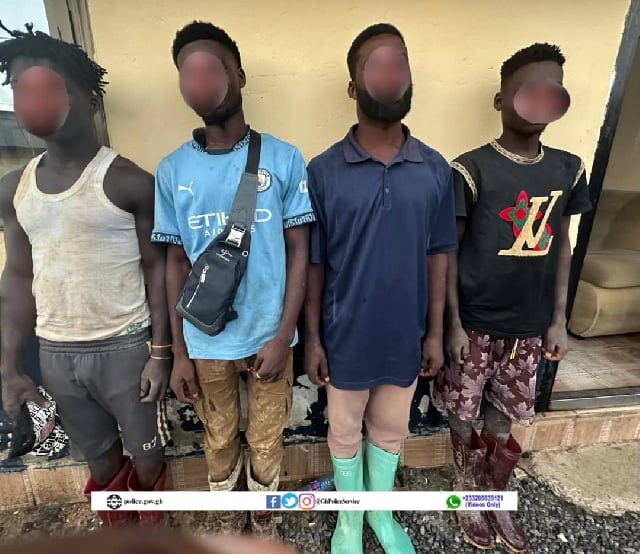The Western Central Region of Ghana is grappling with the devastating consequences of illegal mining, locally known as “galamsey.” This illicit activity has led to the severe pollution of River Bonsa, a vital water source for the region, forcing the Ghana Water Company Limited (GWCL) to shut down the Bonsa water treatment plant. This closure has triggered a widespread water shortage, impacting communities in Tarkwa-Nsuaem and its surrounding areas. Law enforcement officials have responded by arresting eleven individuals, including four Chinese nationals and seven Ghanaians, for their involvement in these illegal mining operations. The arrests highlight the ongoing struggle to combat galamsey and protect Ghana’s precious water resources.
The arrests followed intelligence gathering by the Western Central Police Command, which pinpointed the illegal mining activities responsible for the River Bonsa’s contamination. The pollution has not only disrupted water supply but also poses a significant threat to the health and well-being of the communities reliant on the river. The incident underscores the severe environmental degradation caused by galamsey, which continues to plague Ghana despite government efforts to regulate the mining sector. The apprehension of both Ghanaian and foreign nationals involved in the illegal operation emphasizes the transnational nature of this environmental crime.
ACP Bismark Agyapong, Deputy Western Central Regional Commander, addressed the issue at a press briefing, reaffirming the police’s commitment to combating galamsey and protecting Ghana’s water bodies. He emphasized the collaborative nature of this fight, urging communities to actively participate by providing information on illegal mining activities. This call for public involvement highlights the crucial role of citizens in safeguarding their environment and assisting law enforcement in tackling this complex issue. ACP Agyapong’s statement underscores the police’s dedication to holding perpetrators accountable and working towards restoring the health of the affected water bodies.
The continued prevalence of galamsey in Ghana poses a significant challenge to the country’s environmental sustainability and water security. Despite government interventions and regulatory efforts, illegal mining operations persist, driven by factors such as poverty, unemployment, and the allure of quick profits. The environmental consequences are dire, including deforestation, land degradation, and water pollution, which threaten both human health and biodiversity. The arrest of the eleven individuals serves as a reminder of the ongoing battle against galamsey and the need for comprehensive strategies to address its root causes.
The arrested individuals are expected to face legal proceedings for their involvement in illegal mining and the pollution of River Bonsa. This legal action aims to hold them accountable for their actions and deter others from engaging in similar activities. The prosecution of these individuals sends a strong message about the government’s resolve to enforce environmental regulations and protect the country’s natural resources. The outcome of these legal proceedings will be closely watched as a test of Ghana’s commitment to combating illegal mining.
The fight against galamsey requires a multi-pronged approach, encompassing law enforcement, community engagement, and sustainable economic development. While arrests and prosecutions are essential deterrents, addressing the underlying socio-economic drivers of illegal mining is crucial for long-term success. This involves creating alternative livelihood opportunities, promoting responsible mining practices, and strengthening environmental regulations. The incident at River Bonsa serves as a stark reminder of the urgent need for collective action to protect Ghana’s environment and secure its water resources for future generations. The police have reiterated their commitment to intensifying efforts to combat galamsey, signaling a sustained focus on this critical environmental issue. The combined efforts of law enforcement, communities, and government agencies are essential to effectively address this challenge and ensure the sustainable management of Ghana’s natural resources.


